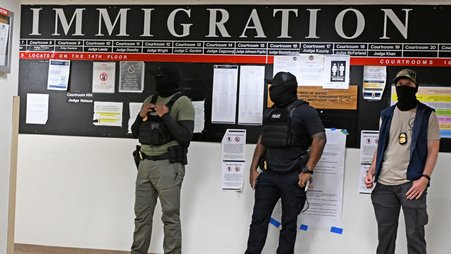Nearly 600 people tried to watch an immigration court hearing in the case of detained activist and U.S. legal permanent resident Mahmoud Khalil on April 8, only to find themselves shut out of the virtual room.
Journalists have been working tirelessly to get the full story since Immigration and Customs Enforcement detained Khalil, who is the first person (but sadly not the last) the Trump administration has detained and attempted to deport based on pro-Palestinian activism and speech. There’s intense public interest in Khalil’s case and what it means for the First Amendment rights of both noncitizens and citizens.
So it’s understandable that a lot of people wanted to watch Khalil’s hearing before an immigration judge in rural Louisiana this week, occurring both in person and virtually. What’s not understandable is the judge’s decision to refuse to allow members of the press and the public to access the hearing through the publicly available online link. The judge also denied a request by Khalil’s lawyer to make future hearings accessible to the press and public online.
That’s why Freedom of the Press Foundation (FPF) and a coalition of press freedom groups sent a letter to the court April 10 asking it to allow the press and the public to attend future hearings in Khalil’s case virtually. The immigration court is expected to rule April 11 on whether Khalil can be deported. The public should be there — in person and virtually — when it does.
Some members of the press were able to attend the April 8 hearing in person. But we know of at least three journalists who tried to attend online and couldn’t. There were likely many more — most news outlets don’t have the resources to send reporters across the country for court hearings. As a result, members of the public lost out on the chance to observe the hearing for themselves or to hear the observations and perspectives of the journalists who attempted to cover it virtually.
Transparency promotes trust in our justice system by allowing members of the public and the press to observe it firsthand. Immigration courts should maximize access to their hearings as a way of reassuring the public that their proceedings are fair and just, not locking the public out of the virtual courtroom.





